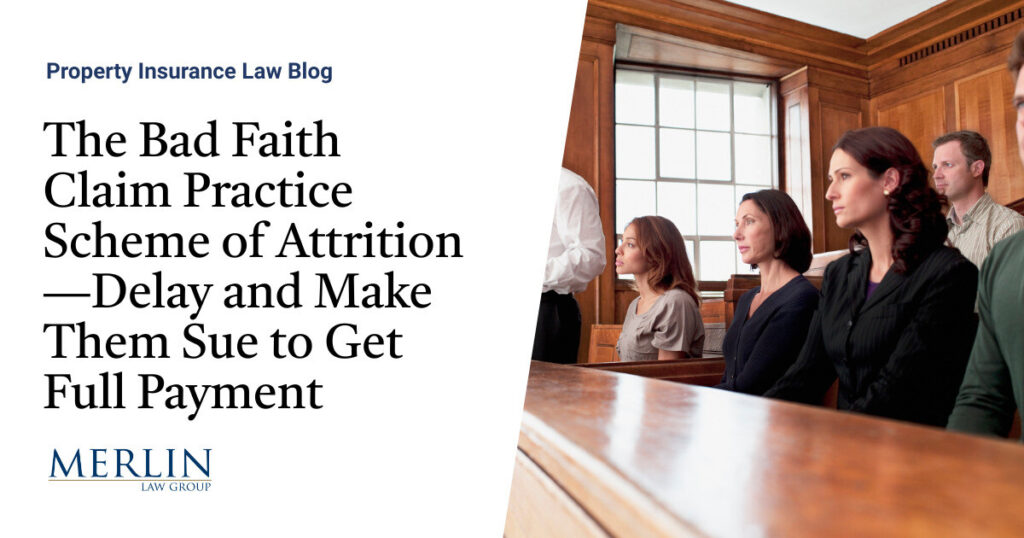The Bad Faith Claim Practice Scheme of Attrition—Delay and Make Them Sue to Get Full Payment

AIG’s subsidiary is back in trial on another bad faith case for failing to pay a wealthy family anywhere near what was owed for a hurricane loss. The appraisal panel issued an award to the policyholders totaling $9,179,272.15. American Home made two payments to the policyholders following Hurricane Irma, which occurred in October 2017. One payment of $202,575.91 was made in March 2018. Another payment of $482,702.99 in April 2019. If you ask me, that is paying far too little, way too late.
The policyholders are trying to show that AIG pays its customers in this manner as a general business practice. AIG is objecting to evidence of other settlement payments made only after other policyholders are forced to bring suit. In a filing,1 AIG cites what the policyholder attorneys are arguing about this relevance:
We are bringing them in to show that AIG has a general business practice of not paying – paying much more to the policyholders only after the policyholder has incurred the cost of hiring its own engineer, hiring its own lawyers, often filing suit, often having to file a Civil Remedy Notice. This whole issue of passing the costs of conducting the actual investigation onto their consumer and shifting the burden to go through these various hurdles show that you will actually pursue it, you will actually dispute it, and that is when American Home will actually pay an amount closer to what is fair.
AIG is trying to limit the evidence to only cases which are resolved through the appraisal process:
For this reason, evidence of the ‘other claims’ settlements is not even relevant to Plaintiffs’ ‘general business practice’ claim. Here, Plaintiffs’ claim is that American Home failed to settle with them – not that it forced Plaintiffs to ‘fight, fight, fight’ before ‘eventually settl[ing].’ Therefore, if the Court is inclined to allow Plaintiffs to offer any ‘other claims’ evidence – and it should not – the Court should limit the ‘other claims’ evidence to claims – like the Newmans’ – that were resolved through the contractual appraisal process.
The insurance company’s conduct is like an armed robber who holds up five victims, gets sued by one, and suggests that everything is okay if he shows the one victim got what he had coming.
For over fifty years, the National Association of Insurance Commissioners specifically noted that it is a wrongful claims practice when an insurer is “Compelling insureds or beneficiaries to institute suits to recover amounts due under its policies by offering substantially less than the amounts ultimately recovered in suits brought by them.”2
This is nothing other than an attrition scheme where some policyholders ignorantly do not know that they are being short-changed and never ask for more. Other policyholders go away to avoid the hassle of having to hire a lawyer and go through proceedings just like this to get what they deserved in the first place. Some policyholders lose because their lawyers or professionals are simply not as good, do not know how, or cannot afford to pay the costs to win. A few get effective help and recover the actual covered loss.
The policyholders in trial are the ones in this latter category. They are now trying to hold the robber insurer accountable.
If the jury decides to deter this wrongful attrition approach to the claims handling of its customers in the future, it must have enough evidence to award an adequate amount to outweigh the insurer’s calculations of the cost of getting caught and brought to justice in this one case. All of this seems relevant.
Thought For The Day
Never, never, never believe any war will be smooth and easy, or that anyone who embarks on the strange voyage can measure the tides and hurricanes he will encounter. The statesman who yields to war fever must realize that once the signal is given, he is no longer the master of policy but the slave of unforeseeable and uncontrollable events.
—Winston Churchill
1 Newman v. American Home Assurance Co., No. 1:22-cv-20979, [Doc. 355] (S.D. Fla.).
2 Unfair Claims Settlement Practices Act, NAIC Model Laws, Regulations, Guidelines and Other Resources (Jan. 1997).







